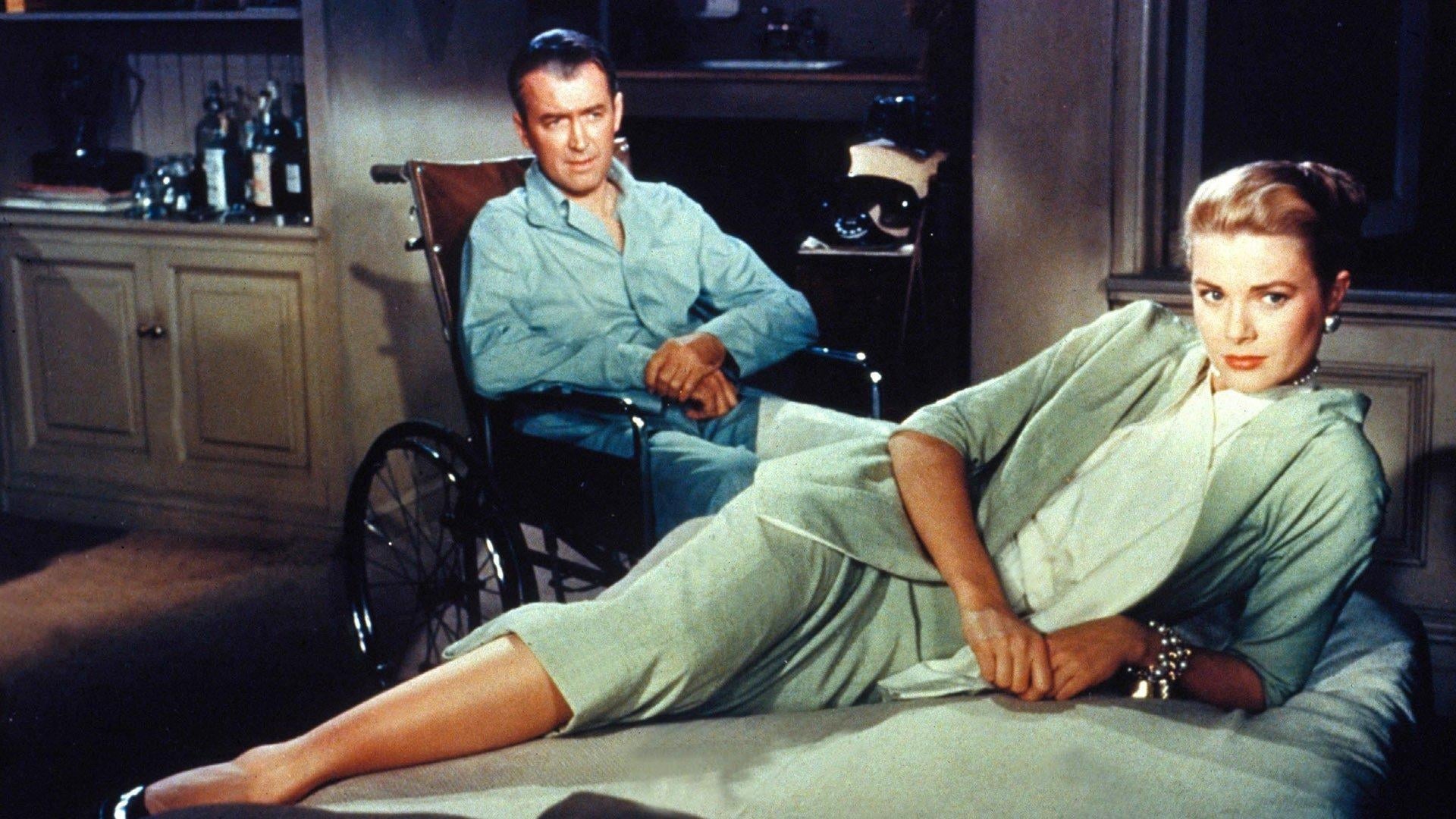Description
A wheelchair-bound photographer spies on his neighbors from his apartment window and becomes convinced one of them has committed murder.

It only takes one witness to spoil the perfect crime.
1954-08-01
$1.0M
112 min
A wheelchair-bound photographer spies on his neighbors from his apartment window and becomes convinced one of them has committed murder.
L.B. Jeffries (Jimmy Stewart), an adventurous photographer, is temporarily immobilized by a serious leg injury. Bored, and living in a time where TV and internet were not available as distractions, he watches the courtyard out his real window and speculates about the lives of the neighbors that he sees. In particular, he wonders whether his neighbor Thorvald (Raymond Burr, who actually looks older than his later character Perry Mason) may have killed his wife.
Hitchcock examines the situation from numerous points of view. At one extreme, Jeff could be considered a brilliant detective who sleuths out a case based purely on close observation. At the other end, he could be considered a voyeur and a paranoid whose suspicions could damage other people. These interpretations are voiced by his acquaintances, including his nurse (Thelma Ritter) and his fiance (Grace Kelly, the future Princess Grace of Monaco). In the end physical evidence is found that settles the Thorvald case but leaves Jeff's motivation still in question.
Hitchcock takes advantage of the situation to introduce numerous subplots -- but they're MINIMALIST subplots, where the audience only sees what Jeff sees from his window. (Mild spoilers follow) Newlyweds quarrel, a depressed woman considers suicide but is rescued by a neighbor; a sexy girl ("Miss Torso") turns out to be not a party girl but devoted to an absent boyfriend.
An entertaining thing about this movie is that we have numerous actors -- Stewart, Kelly, and Burr -- who are to become more famous for later movies and incidents.
It Had To Be Murder.
L.B. Jefferies is a wheelchair bound photographer who by way of relieving his boredom, starts observing the lives of all his neighbours from his apartment window. As he gets deeper into the lives of all around him, he becomes convinced that one of hem has committed the act of murder, thus putting himself and those close to him in mortal danger.
Much like most of Alfred Hitchcock's other lauded pictures, Rear Window has been dissected, examined, appraised and written about by far more versed people than myself, a mere film fanatic. So how do I even start to write a review of a film that I view as one of Hitchcock's best? Well maybe I should just write what I like about it without delving into psycho babble and a deconstruction of the human psyche and all its little offshoots! So I will!.
Rear Window is adapted by Alfred Hitchcock and his writer John Michael Hayes, from the Cornell Woolrich story called It Had To Be Murder/Murder From A Fixed Viewpoint. The film of course forces us the viewers to become voyeurs, watching a newly hooked voyeur go about his business. Quite a neat trick from Hitchcock, and one can reasonably assume that the maestro director was chuckling with glee within his genius girth.
Working from the confines of a single set, Hitchcock has molded a suspenseful, intriguing, cheeky and sexy picture, with a top line cast giving the smart screenplay the performances it deserved. What is often forgot by those more concerned with the psychological aspects of Rear Window is the blatant irony of L.B. Jefferies situation, his obsession with the neighbours is not confined to a probable case of murder, his interest first and foremost is with the love lives of those he observes, thus forcing (excusing) him to acknowledge the love from the woman who so wants to be in his life!
It's also important to note the merits of each character of the piece, those that visit Jefferies and the conversations that take place, even the suspected murderer has a bemused interest pouring from his very frame. Rarely has a film been produced that has every single character having a critical element to the story. Then there is the ending where Hitchcock and his team weave all strands together to leave us wryly smiling away whilst simultaneously feeling that we have been had by the big director, and be under no illusions here, we have been at the mercy of a genius and party to a film of unquestionable quality. 10/10
Probably have seen this a half dozen times over the years and still is my favorite Hitchcock movie, favorite mind you not best. Simple story and taking place in one location, but good performances from James Stewart and Grace Kelly. 4.5/5
Jimmy Stewart is cracking as the laid-up photographer who spends his chair-ridden days casually observing the day-to-day activities of his neighbours. Gradually, he becomes suspicious of one of them as the wife suddenly disappears and the husband (Raymond Burr) starts making odd trips out at night; calling long distance and generally acting oddly. Grace Kelly (his girlfriend) thinks this all a bit too prurient for her but is slowly drawn into his web of intrigue and ends up an active participant with his investigations as we now have a great conspiracy theory thriller. Thelma Ritter is great as "Stella" as is Wendell Corey as "Det. Doyle". This is a tight, tense drama with a really cohesive cast under the skilful direction of the master of this genre.